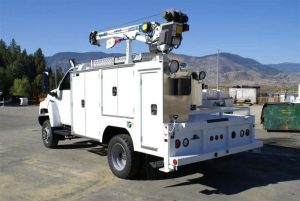
Following research at the CNBC, Nor-Mar Industries has received approval for, and successfully implemented changes to, welding protocols to deliver premium-quality products.
Source: Canadian Neutron Beam Centre (CNBC)
Contact: cnbc@cnl.ca
Image: Shutterstock

A utility truck retrofitted by Nor-Mar Industries
Nor-Mar Industries strips trucks to custom fit them with cranes, heavy-duty equipment, storage and other features needed by clients in the forestry, construction, mining and oil sectors. Before delivery to the client, strength and toughness of the welded frames must satisfy safety regulations.
Nor-Mar recently finished a research project with Professor Lukas Bichler of the University of British Columbia to better understand Nor-Mar’s manufacturing procedures and practices, as well as to develop protocols to enhance the quality of its welded frames, made of AR200 steel. Welding methods are known to create stresses that must be minimized to prevent inclusions or defects, such as fissures, tears or porosity.
Because retrofitting vehicles is a stringently regulated activity, the ability to measure stress in welded truck frames will continue to be needed.
The research team accessed the Canadian Neutron Beam Centre in August 2013 to non-destructively determine the residual stresses. The project not only provided scientific evidence that Nor-Mar’s welding practices were on track, but also identified areas that could be enhanced at the sample preparation stage.
Subsequently, Nor-Mar modified its welding protocols, which have now been approved by the Canadian Welding Bureau for use. As a result, Nor-Mar has successfully implemented the needed changes in order to deliver a premium-quality product to its clients.
Industries that retrofit vehicles operate in a stringent regulatory environment. Thus, it is likely that knowledge of the stress in welded truck frames will continue to be needed as these industries improve their practices, develop new products and respond to changes in regulations.
